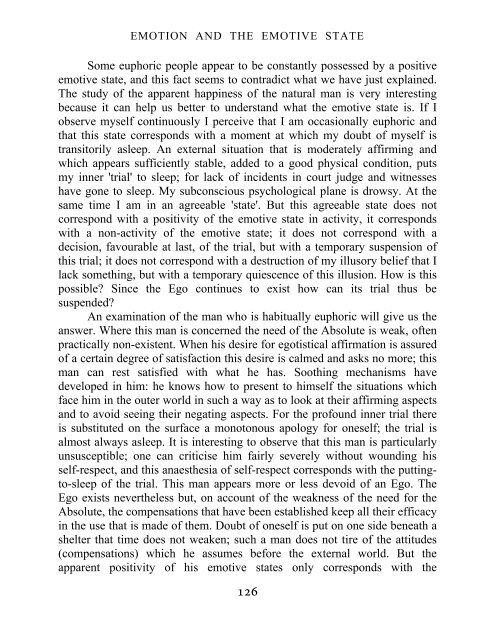The Supreme Doctrine - neo-alchemist
The Supreme Doctrine - neo-alchemist
The Supreme Doctrine - neo-alchemist
Create successful ePaper yourself
Turn your PDF publications into a flip-book with our unique Google optimized e-Paper software.
EMOTION AND THE EMOTIVE STATE<br />
Some euphoric people appear to be constantly possessed by a positive<br />
emotive state, and this fact seems to contradict what we have just explained.<br />
<strong>The</strong> study of the apparent happiness of the natural man is very interesting<br />
because it can help us better to understand what the emotive state is. If I<br />
observe myself continuously I perceive that I am occasionally euphoric and<br />
that this state corresponds with a moment at which my doubt of myself is<br />
transitorily asleep. An external situation that is moderately affirming and<br />
which appears sufficiently stable, added to a good physical condition, puts<br />
my inner 'trial' to sleep; for lack of incidents in court judge and witnesses<br />
have gone to sleep. My subconscious psychological plane is drowsy. At the<br />
same time I am in an agreeable 'state'. But this agreeable state does not<br />
correspond with a positivity of the emotive state in activity, it corresponds<br />
with a non-activity of the emotive state; it does not correspond with a<br />
decision, favourable at last, of the trial, but with a temporary suspension of<br />
this trial; it does not correspond with a destruction of my illusory belief that I<br />
lack something, but with a temporary quiescence of this illusion. How is this<br />
possible? Since the Ego continues to exist how can its trial thus be<br />
suspended?<br />
An examination of the man who is habitually euphoric will give us the<br />
answer. Where this man is concerned the need of the Absolute is weak, often<br />
practically non-existent. When his desire for egotistical affirmation is assured<br />
of a certain degree of satisfaction this desire is calmed and asks no more; this<br />
man can rest satisfied with what he has. Soothing mechanisms have<br />
developed in him: he knows how to present to himself the situations which<br />
face him in the outer world in such a way as to look at their affirming aspects<br />
and to avoid seeing their negating aspects. For the profound inner trial there<br />
is substituted on the surface a monotonous apology for oneself; the trial is<br />
almost always asleep. It is interesting to observe that this man is particularly<br />
unsusceptible; one can criticise him fairly severely without wounding his<br />
self-respect, and this anaesthesia of self-respect corresponds with the puttingto-sleep<br />
of the trial. This man appears more or less devoid of an Ego. <strong>The</strong><br />
Ego exists nevertheless but, on account of the weakness of the need for the<br />
Absolute, the compensations that have been established keep all their efficacy<br />
in the use that is made of them. Doubt of oneself is put on one side beneath a<br />
shelter that time does not weaken; such a man does not tire of the attitudes<br />
(compensations) which he assumes before the external world. But the<br />
apparent positivity of his emotive states only corresponds with the<br />
126




